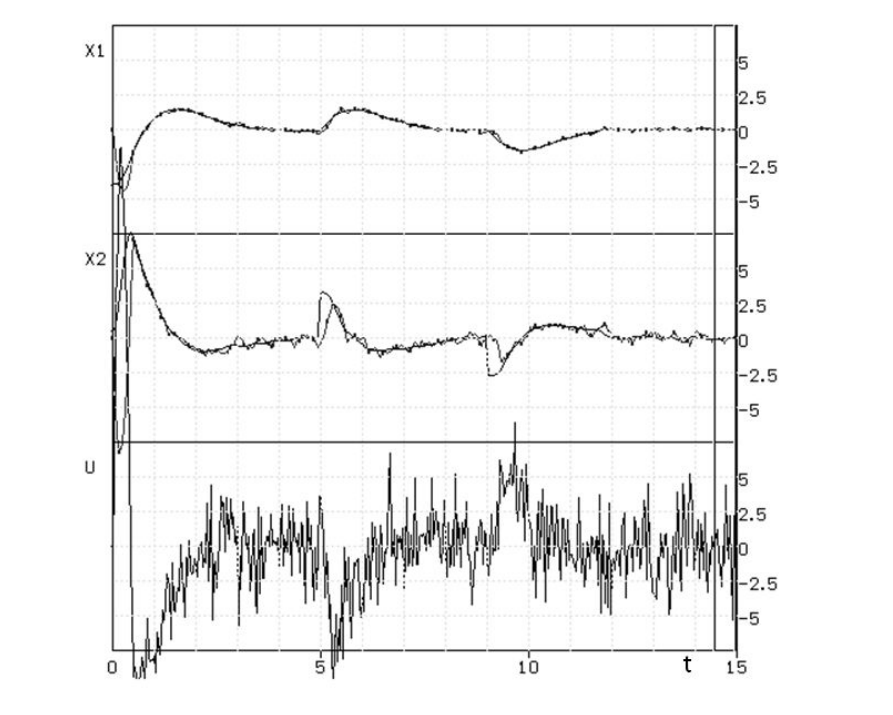State estimators and observers for continuous and discrete linear systems
Part 2. Integral observers for exact state reconstruction
DOI:
https://doi.org/10.5604/01.3001.0013.2871Słowa kluczowe:
exact state observers, linear systems, state observers with minimal normAbstrakt
In the paper, the exact state observers will be presented. The state estimators and observers can be used in technical processes for many purposes like the fault detection and diagnosis, the implementation of the state controllers, and soft reconstruction of inaccessible for measurements variables of the system. As the standard, for continuous systems the differential estimators of Kalman filter or Luenberger type observer are commonly used. However, if the initial conditions of the real state are unknown, both estimators guarantee only an asymptotic quality of the real state tracking. The paper presents another type of the state observers, which for continuous system have the structure given by two integral operators. Based on measurements of the system input and output signals on some predefined finite time interval T, they can reconstruct the initial state exactly. In on-line version, the exact state reconstruction is performed continuously for every t, based on special procedure executed within two moving windows of width T, on sliding time interval [t-T, t].
Statystyka pobrań
Bibliografia
Byrski J. Algorytmy ze skończoną pamięcią do przetwarzania sygnałów w diagnostyce procesów, Monografie, Wydawnictwa AGH, Kraków, 2016. Google Scholar
Byrski J, Byrski W, State estimators and observers for continuous and discrete linear systems. Part 1. Differential asymptotic state estimators, Sci, Tech. Innov., 2018;3(2):62-68. Google Scholar
Kalman R. A new approach to linear filtering and prediction problems, Journal of Basic Engineering, 1960. Google Scholar
Luenberger D. Observers for multivariable systems. IEEE TAC-11. 1966, p.190. Google Scholar
Kwakernaak H, Sivan R. Linear Optimal Control Systems. Wiley; 1972. Google Scholar
Franklin G, Powell D, Workman M. Digital Control of Dynamic System. Addison Wesley;1990. Google Scholar
Byrski W, Fuksa S. Optimal finite parameter observer. An application to synthesis of stabilizing feedback for a linear system. Control and Cybernetics. 1984;13,(1). Google Scholar
Fuksa S, Byrski W. General approach to linear optimal estimator of finite number of parameters. IEEE Transaction on AC-29, 1984. Google Scholar
Halmos P, Hilbert A. Space Problem Book. New York: Springer; 1982. Google Scholar
Byrski W. Optimal State Observers with Moving and Expanding Observation Window. Proc. of Intern.Conference on Modeling & Simulation, IASTED, Innsbruck, Austria, 1993. Google Scholar
Byrski J, Byrski W. An Optimal Identification of the Input-Output Disturbances in Linear Dynamic Systems by the Use of the Exact Observation of the State. Hindawi. Mathematical Problems in Engineering. Article ID 8048567, 2018. Google Scholar
Byrski W, Pelc M. The finite time state observer and its cooperation with Kalman Filter algorithm. Modelling, Identification, and Control MIC 2004. Proceedings of the 23rd IASTED International Conference; 2004 Feb 23–25; Grindelwald, CH. ACTA Press. pp. 160–165, 412-084. Google Scholar
Byrski W. Integral Description of the Optimal State Observers. II European Control Conference, ECC’93; 1993; Groningen, NL. Google Scholar
Byrski W. Theory and Application of the Optimal Integral State Observers. III European Control Conference. ECC; 1995; Roma, IT, p.526-531. Google Scholar
Byrski W, Kubik P. Integral Observer of Finite State in Heat Equation Approximated by ODE. IFAC/IMACS Large Scale Systems Symposium LSS’98; 1998; Patras, GR. Google Scholar
Byrski W. The Survey For The Exact and Optimal State Observers In Hilbert Spaces. VII European Control Conference, ECC’03; 2003; Cambridge, UK. Google Scholar
Pelc M, Byrski W. Full parallel decomposition of computational algorithm with discrete state estimator. 19th IASTED International Conference on Parallel and Distributed Computing and Systems; 2007; Cambridge, MA, USA. Google Scholar
Byrski J, Byrski W. A double window state observer for detection and isolation of abrupt changes in parameters. Int. Journal of Appl. Math. And Computer Sci. 2016;26(3):585–602. DOI: 10.1515/amcs-2016-0041. Google Scholar
James MR. Finite time observers and observability, Proc.29th IEEE Conf.on Decision & .Contr.; 1990; Honolulu, HI, USA. Google Scholar
Medvedev A, Toivonen HT. A continuous finite-memory deadbeat observer. American Control Conference; 1992; Chicago, USA. Google Scholar
Medvedev A. Fault detection and isolation by functional continuous deadbeat observers. Int. J. Control. 1996;64. Google Scholar
Medvedev A. State estimation and fault detection by a bank of continuous finite-memory filters. International Journal of Control. 1998;69(4);499-517. DOI: 10.1080/002071798222668. Google Scholar
Nuninger W, Kratz F, Ragot J. Finite Memory Generalized State Observer for failure Detection in Dynamic Systems, IEEE Conf. on Decision & Control; 1998; Tampa, USA Google Scholar
Engel R, Kreisselmeier G. A Continuous –Time Observer which Converges in Finite Time. IEEE Trans.AC –47, 2002;7:1202. Google Scholar
Reger J, Jouffroy J. On Algebraic Time-Derivative Estimation and Deadbeat State Reconstruction. 48th IEEE Conference on Decision and Control; 2010; Shanghai, CN. Google Scholar
Fliess M, Sira-Ramirez HJ. State reconstructors: a possible alternative to asymptotic observers and Kalman filters, CESA Conference, 2003. Google Scholar
Hocine A, Maquin D, Ragot J. Finite memory observer for switching systems, IFAC World Congress, 2005. Google Scholar

Pobrania
Opublikowane
Jak cytować
Numer
Dział
Licencja
Prawa autorskie (c) 2019 Państwowa Wyższa Szkoła Zawodowa w Tarnowie & Autorzy

Utwór dostępny jest na licencji Creative Commons Uznanie autorstwa – Użycie niekomercyjne 4.0 Międzynarodowe.



